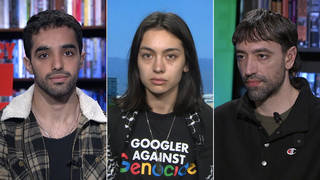
Related
Hillary Clinton’s surprise victory in New Hampshire guarantees a longer, more competitive Democratic primary season. It’s like money in the bank for broadcasters, as the first billion-dollar presidential campaign continues.
While the world’s oldest democracy, the United States, spends trillions of dollars claiming to bring democracy to Afghanistan and Iraq (through the barrel of a gun), what have we got here? A process driven by major donors shoveling huge sums of cash into the troughs of television broadcasters, who are holding the electoral process hostage through their control of the public airwaves. The same broadcasters arbitrarily exclude viable candidates from their so-called debates, elevating themselves to kingmaker.
According to TNS Media Intelligence/CMAG, a group that tracks political advertising, overall spending by the presidential candidates in Iowa topped $50 million. In 2004, spending was closer to $9 million. The group reported that spending on all campaign and issue ads, for all current races (presidential and others) in the U.S., reached $715 million by the end of 2007. WMUR, New Hampshire’s only statewide commercial television channel, raked in millions of dollars from political advertising this primary season. WMUR’s headquarters is dubbed “The House That Forbes Built,” after Steve Forbes spent so much on ads in his 1996 presidential run.
With the new compressed, “front-loaded” primary schedule, with more and more states moving their primary dates closer to those first-in-nation events in Iowa and New Hampshire, the need for money is extreme. Feb. 5, dubbed “Super-Duper Tuesday,” will see primaries in more than 20 states, including huge media “markets” like New York, Illinois and California. Barack Obama, Clinton and John Edwards will have to continue to raise huge sums, only to hand most of it over to broadcasters, who, through their control of the public airwaves, dole out access to the electorate.
One way Fox News/News Corp. recently tried to influence the process was to exclude Ron Paul from a Republican candidate forum in New Hampshire, two days before that state’s first-in-the-nation primary. Paul was the most successful fundraiser among Republican candidates in the fourth quarter of 2007; he decisively beat Rudy Giuliani in the Iowa caucus, with 10 percent of the vote versus Giuliani’s 4 percent. Fox nixed Paul from the debate, while Giuliani was welcomed. The New Hampshire Republican Party pulled its support from the debate. Party chair Fergus Cullen said: “The first-in-the-nation New Hampshire primary serves a national purpose by giving all candidates an equal opportunity on a level playing field. Lesser-known, lesser-funded underdogs have a fighting chance to establish themselves as national figures. [W]e believe all recognized major candidates should have an equal opportunity to participate in pre-primary debates and forums.”
Paul appeared on NBC’s “Tonight Show With Jay Leno” (which has restarted production despite the ongoing Writers Guild of America strike, which is keeping Democratic candidates away from the strikebreaking network shows). Leno asked him how he was responding to Fox’s banning him: “I realized that they really had some property rights ability there, and I wasn’t going to crash the party. And I thought, ‘Well, maybe I ought to sue them.’ I’ve decided what to sue them over, and that is for fraud, because of this ‘fair and balanced’ idea.”
While threatening to sue the network for its fraudulent claim of being “Fair and Balanced” (a ludicrous motto for Fox), Paul neglects the key point: The airwaves are not the private property of Fox. Rupert Murdoch and his News Corp. profit from their use of the public airwaves, which comes with the responsibility to serve the public interest. If the electoral process itself, the nuts and bolts of democracy, does not rate as a public interest, what does?
ABC News pulled the same stunt on Dennis Kucinich, barring him from the debate it sponsored on Sunday night. Kucinich filed an emergency complaint with the Federal Communications Commission, saying, “ABC should not be the first primary.” He noted that ABC “is a wholly-owned subsidiary of Walt Disney Co., whose executives have contributed heavily to … Sens. Hillary Clinton and Barack Obama, former Sen. John Edwards and Gov. Bill Richardson.” ABC limited the debate to those four by requiring participants to place at least fourth in the Iowa caucus to qualify. But the Kucinich campaign said it “bypassed the Iowa caucuses,” preferring to focus resources on New Hampshire, then got shut out of the debate. Kucinich’s key points, getting out of Iraq and promoting single-payer health care, went virtually unheard in New Hampshire.
The majority of the money that candidates are forced to raise is for TV ads. They are running to be the nation’s top public servant. The networks should provide the airtime as a free public service. The airwaves belong to the public; they are a national treasure. They should be used to enrich our electoral process. Instead, they are exploited by highly profitable TV networks, forcing the candidates to rely on monied interests. This vicious cycle must be broken.
broadcasters, who are holding the electoral process hostage through their control of the public airwaves. The same broadcasters arbitrarily exclude viable candidates from their so-called debates, elevating themselves to kingmaker.










